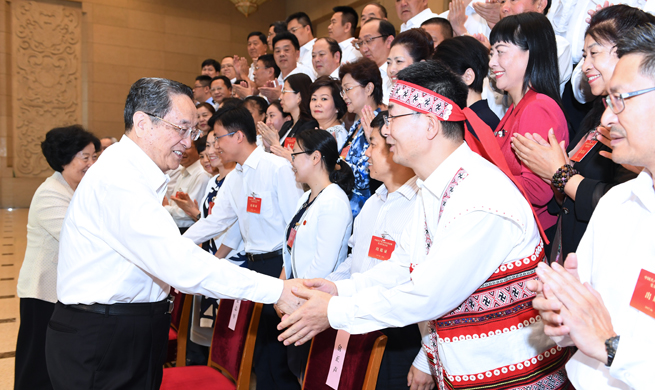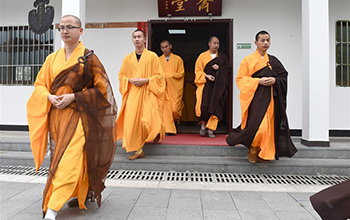BERLIN, June 21 (Xinhua) -- The downward trend experienced in German opinion polls by the SPD and its leader Martin Schulz continues, according to a "Stern-RTL Wahltrend" survey published on Wednesday.
While Chancellor Angela Merkel's Christian Democratic Union (CDU) and its sister party, the Bavarian Christian Social Union (CSU), improved their electoral standing by one percentage point to a combined 39 percent, the SPD languished at 23 percent (minus one percentage point compared to last week).
As a consequence, the SPD has fallen back to the level of support it last held before the nomination of former president of the European Parliament Martin Schulz as party leader in March 2017 which was followed by a short-lived surge in polls.
The Left party (Linke), which overlaps ideologically in some areas with the SPD but endorses a more uncompromising socialist vision, rose by two percentage points to 10 percent, making it the third largest fraction in the German Federal Parliament (Bundestag).
The Liberal party (FDP) fell by one percentage point to eight percent, the same level of support enjoyed by the Green party (Gruene).
The right-wing populist Alternative for Germany, which enjoyed national levels of support as high as 16 percent (ARD Deutschlandtrend) in September 2016 at the height of the refugee crisis, stagnated at seven percent.
When asked whom they would directly elect as chancellor, 53 percent of respondents voiced support for the incumbent Angela Merkel who is eyeing her fourth term in national elections this summer.
Chancellor Merkel, who has been in office over 11 years, thus enjoyed a lead of 31 percentage points over her political rivals.
Martin Schulz personal support fell to 22 percent in the same category, down one percentage point compared to the previous week.
Several observers noted the impression given by the figures that the Left was successfully poaching supporters from the SPD.
"Apparently [the Left party] has succeeded in attracting voters from the left wing of the SPD following its party conference where a radical program centered on social justice was presented," said Manfred Guellner, head of the Forsa Institute which conducted the survey.
He singled out demands for a higher minimum wage, taxes on the rich, and a cap on rents, as elements of the Left party's manifesto, which appeared bold in comparison to the SPD's proposals.
Martin Schulz is facing a wave of criticism from industry representatives and other parties after presenting the SPD's taxation plans on Tuesday.
Schulz promised tax relief to low- and middle income earners worth at least 15 billion euros (16.7 billion U.S. dollars) annually.
Additionally, those income classes would benefit from lower social insurance costs while taxes on high earners would rise.
The Association of German Chambers of Industry and Commerce (Deutscher Industrie- und Handelskammertag DIHK) voiced concerns that the plans would burden small and mid-sized companies and hence carry negative implications for the availability of jobs and training, as well as denting investment and innovation.
The Federal Association of German Industry (Bundesverband der Deutschen Industrie, BDI) reacted similarly, lamenting that the SPD had offered "no good ideas" on taxation.
The debate further compounds the political woes of Martin Schulz who was seen as a serious contender to Angela Merkel for the office of chancellor when his nomination was first announced.
In January, Schulz was still tied with Merkel for popularity at 41 percent according to an ARD-Deutschlandtrend survey.
However, more recent polls suggest that this initial support has evaporated.
An analysis by the Yougov Institute showed that nearly a quarter (24 percent) of those respondents who would have voted for the SPD in February had since changed their minds.

















